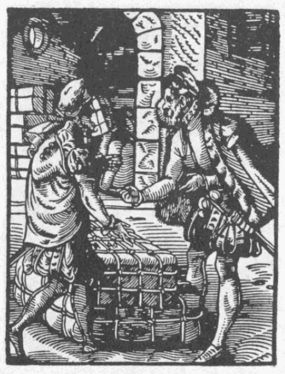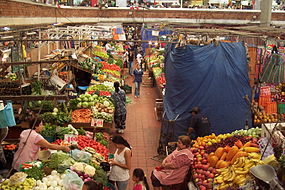|
Trade is the transfer of ownership of goods and services from one person to another. Trade is sometimes loosely called commerce or financial transaction or barter. A network that allows trade is called a market. The original form of trade was barter, the direct exchange of goods and services. Later one side of the barter were the metals, precious metals (poles, coins), bill, paper money. Modern traders instead generally negotiate through a medium of exchange, such as money. As a result, buying can be separated from selling, or earning. The invention of money (and later credit, paper money and non-physical money) greatly simplified and promoted trade. Trade between two traders is called bilateral trade, while trade between more than two traders is called multilateral trade. Trade exists for man due to specialization and division of labor, most people concentrate on a small aspect of production, trading for other products. Trade exists between regions because different regions have a comparative advantage in the production of some tradable commodity, or because different regions’ size allows for the benefits of mass production. As such, trade at market prices between locations benefits both locations. Retail trade consists of the sale of goods or merchandise from a very fixed location, such as a department store, boutique or kiosk, or by mail, in small or individual lots for direct consumption by the purchaser. Wholesale trade is defined as the sale of goods or merchandise to retailers, to industrial, commercial, institutional, or other professional business users, or to other wholesalers and related subordinated services. Trading can also refer to the action performed by traders and other market agents in the financial markets. Vasco da Gama pioneered the European Spice trade in 1498 when he reached Calicut after sailing around the Cape of Good Hope at the southern tip of the African continent. Prior to this, the flow of spice into Europe from India was controlled by Islamic powers, especially Egypt. The spice trade was of major economic importance and helped spur the Age of Discovery in Europe. Spices brought to Europe from the Eastern world were some of the most valuable commodities for their weight, sometimes rivaling gold. In the 16th century, the Seventeen Provinces were the centre of free trade, imposing no exchange controls, and advocating the free movement of goods. Trade in the East Indies was dominated by Portugal in the 16th century, Holland in the 17th century, and the British in the 18th century. The Spanish Empire developed regular trade links across both the Atlantic and the Pacific Oceans. 
Danzig in 17th century In 1776, Adam Smith published the paper An Inquiry into the Nature and Causes of the Wealth of Nations. It criticised Mercantilism, and argued that economic specialisation could benefit nations just as much as firms. Since the division of labour was restricted by the size of the market, he said that countries having access to larger markets would be able to divide labour more efficiently and thereby become more productive. Smith said that he considered all rationalisations of import and export controls "dupery", which hurt the trading nation as a whole for the benefit of specific industries. In 1799, the Dutch East India Company, formerly the world’s largest company, became bankrupt, partly due to the rise of competitive free trade. 
Berber Trade with Timbuktu, 1853
The ascendancy of free trade was primarily based on national advantage in the mid 19th century. That is, the calculation made was whether it was in any particular country’s self-interest to open its borders to imports. John Stuart Mill proved that a country with monopoly pricing power on the international market could manipulate the terms of trade through maintaining tariffs, and that the response to this might be reciprocity in trade policy. Ricardo and others had suggested this earlier. This was taken as evidence against the universal doctrine of free trade, as it was believed that more of the economic surplus of trade would accrue to a country following reciprocal, rather than completely free, trade policies. This was followed within a few years by the infant industry scenario developed by Mill promoting the theory that government had the "duty" to protect young industries, although only for a time necessary for them to develop full capacity. This became the policy in many countries attempting to industrialise and out-compete English exporters. Milton Friedman later continued this vein of thought, showing that in a few circumstances tariffs might be beneficial to the host country; but never for the world at large. Main article: International trade
International trade is the exchange of goods and services across national borders. In most countries, it represents a significant part of GDP. While international trade has been present throughout much of history (see Silk Road, Amber Road), its economic, social, and political importance have increased in recent centuries, mainly because of Industrialization, advanced transportation, globalization, multinational corporations, and outsourcing. In fact, it is probably the increasing prevalence of international trade that is usually meant by the term "globalization". Empirical evidence for the success of trade can be seen in the contrast between countries such as South Korea, which adopted a policy of export-oriented industrialization, and India, which historically had a more closed policy (although it has begun to open its economy, as of 2005). South Korea has done much better by economic criteria than India over the past fifty years, though its success also has to do with effective state institutions.
From Wikipedia, the free encyclopedia : Trade and repair of caravans |





